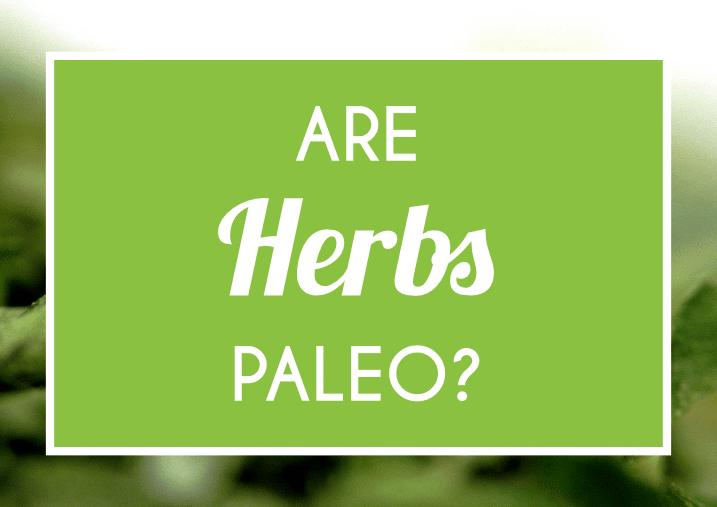Table of Contents
The Quick Answer
Yes, herbs are paleo.

Why Are Herbs Paleo?
There are many different kinds of herbs and the good news is that some of the most popular ones (cilantro, oregano, mint, and basil) are also some of the healthiest.
Herbs come with numerous benefits and uses, but what they all have in common is that they are naturally found in plant form. They are unprocessed flavor enhancers with strong disease-preventing properties and high antioxidant levels.
Herbs are essentially a very natural and healthy way to add more flavor to your unprocessed paleo foods without needing to rely on artificial flavors or extra sugar or sodium. While many condiments like ketchup, BBQ sauce, honey mustard, and soy sauce contain lots of chemicals, additives and sugar, herbs contain none of these things and are instead “clean” sources of flavor.
Herbs are also virtually free of calories, carbs, sugar, fiber, protein, and fat. The amount of any herb that we typically add to a meal is pretty small, yet herbs pack a lot of flavor into a small package.
Some of the best herbs to keep in your kitchen, perhaps by even growing them yourself, are cilantro, thyme, oregano, mint, and basil. That said, all herbs are generally very good for you.
Cilantro
Cilantro is commonly referred to as an anti-diabetic plant because of its ability to help stabilize blood sugar levels. It contains an oil that is rich in beneficial phytonutrients, making it highly anti-inflammatory, anti-bacterial, and anti-microbial. It also has properties that have cholesterol-lowering effects.
Mint
Mint is used as a digestive aid, thanks to its ability to combat nausea. The aroma and taste of mint activate the salivary glands in our mouths, as well as other glands that secrete digestive enzymes, helping to reduce the stress put on our digestive systems. Mint is also anti-inflammatory, it helps with headaches, it reduces the effects of respiratory disorders, it helps to soothe coughs and colds, and it decreases some symptoms of asthma. It’s also a great way to soothe skin irritations or acne.
Thyme
Thyme has many important medicinal effects, thanks to its high antioxidant powers. Antioxidants fight free radicals in the body, slowing our ageing process and protecting us from developing chronic diseases. Thyme is great for preventing mucus from forming in the lungs, throat, and intestines, helping to keep our immune systems strong and preventing us from becoming sick. It’s also thought to help with respiratory problems such as coughs and bronchitis, which is why it is used in many over-the-counter vapor rubs that reduce the symptoms of colds and flus. Thyme is an antiseptic, so it shows up in many toothpastes. It is also high in vitamins K and A, manganese, and iron.
Oregano
Oregano contains high levels of vitamins and minerals like calcium, magnesium, zinc, iron, potassium, copper, boron, manganese, vitamin C, vitamin K, vitamin A, and more. You can see that it’s one powerful little herb!
This herb is extremely high in antioxidants and flavonoids, making it a powerful protector against cancer, brain disease, and heart disease. In fact, oregano is thought to have more antioxidant power than apples, potatoes, oranges, and even blueberries. The compounds in oregano are also anti-fungal (helping to prevent the growth of bacteria on the skin) and ant-parasitic (helping to ward off foreign viruses and harmful microbes that might try to live in the intestines and cause sickness). Finally, oregano has traditionally been used as a digestive aid, thanks to its ability to help relieve stomach pain and the feeling of sickness.
Basil
Basil is an excellent source of many nutrients including vitamin K, vitamin C, vitamin A, manganese, and calcium. Basil helps to protect the body from getting sick by boosting immunity, keeping the skeletal structure strong, and keeping hair, skin, and nails looking healthy by increasing cell production. Another surprising benefit of basil is that it contains omega-3 fatty acids, which produce a wide range of benefits connected to brain and heart health. Basil has antioxidant power as well, meaning it is a valuable protector of DNA, helping to decrease the risk of cell mutation and tumor growth. On top of these benefits, basil is thought to be anti-bacterial and anti-inflammatory, giving it a wide range of uses medicinally.
Is There Any Confusion When It Comes To Herbs Being Paleo?
No, there isn’t any confusion. Everyone agrees that herbs are natural, healthy plant foods that are paleo. They are a great addition to the paleo diet because they help to heal the body, they keep foods interesting, and they don’t add any unwanted artificial ingredients to your food.
So Are Herbs Paleo?
Yes, herbs are paleo. Different types of herbs have been used around the world for medicinal purposes and for healing for thousands of years. Today we know that herbs come with many different benefits and we therefore encourage you to include them as part of your paleo diet.
How To Know What Is And Isn’t Paleo
Check out Paleo.io, the mobile app that answers the question, “is __ paleo?” Paleo.io comes with the most comprehensive paleo diet food list out there, so no matter which food you’re confused about, you’ll always be able to find out whether or not it’s paleo.
Photo credit: Kevin Dooley